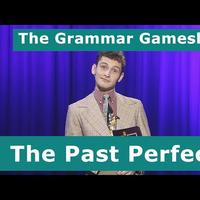14- The Past Perfect Tense
Hello, and welcome to today's Grammar Gameshow!
I'm your host, Will!
The last document that ever matters!
And of course let's not forget Leslie,
our all-knowing voice in the sky.
Hello everyone!
Tonight we're going to ask you three questions about…
The past perfect.
That useful tense using ‘had' and a past participle
for talking about the past that's past the past!
OK! Now, let's meet our contestants!
Hi, Will. My name's Mark!
And contestant number two?
Hello, everyone. I'm Levington!
Welcome back, Levington.
Win this one,
and you'll be on a par with our last champion,
Mya.
Really?!
Where is she now?
Oh, don't worry about her.
She's squirreled away somewhere.
Ok. Let's get going
and don't forget
you can play along at home too.
Our first round is a find the mistake round.
Can you correct the mistake
in each of these sentences?
I didn't eat by the time I had left home.
I hadn't eaten by the time I left home.
Correct!
When I had arrived home,
my sister already made lunch.
When I arrived home,
my sister had already made lunch.
Correct!
I had woken up late
because I forgot to set my alarm clock.
I woke up late because
I'd forgotten to set my alarm clock.
Correct!
Leslie?
Good job everyone!
The past perfect describes actions
that happened before the point in the past
that we are currently speaking about.
Once a time in the past has been set,
it allows us to go back for a moment
to a point before that.
Events in the past perfect
always take place before the past simple
or past continuous.
Well done! Have 23 points between you
to be divided according to the day of the week,
and the strength of your personality.
Let's have a bonus question.
Look at this sentence and tell me how the verb phrase
‘had had' should be pronounced.
I had had a shower.
Do it again.
I had had a shower.
Sorry…I didn't quite catch that.
Try closing one eye and pulling your lips back.
Had had?
One more time.
Maybe hold your arms above your head
Had had...had had?
One for luck!
Just lift your leg.
A little higher…
higher still.
Had had!?!
Totally wrong I'm afraid.
And your attempt to distract us
with your weird body movements
only makes things more embarrassing for you.
What a shame.
Levington?
I had had a shower.
Well done!
Leslie?
When ‘had' is pronounced as an auxiliary verb,
it takes its weak form!
If the main verb is also ‘had',
we pronounce the first one weak
and the second one strong.
I had had a great time.
15 points for Levington.
On to question two!
The past perfect is formed with ‘had'
and a past participle verb,
but in which other grammatical structure
is the past perfect's form required?
It's got to be the past perfect continuous!
‘Had' plus ‘been' plus verbING
A swing...
and a miss there Levington.
Mark, would you like to give it a try?
No idea.
Are you sure?
If Levington had known the answer,
he would have got the points!
Third conditional!
It's a third conditional.
Leslie?
Well done!
The third conditional is used to talk about the
possible consequences of past events
that didn't happen.
Its formula uses the past perfect
in the conditional clause.
If + had + past participle,
would + have + past participle.
Well done!
If Levington had given me the answer,
I would have given him twenty points.
But for you?
Three!
But…
On to our last question.
The past perfect can also be used to talk about
unrealised hopes.
In this case, its pronunciation changes significantly.
How?
Isn't the auxiliary verb usually stressed
instead of unstressed?
Very good!
Can you give me an example?
I had intended to just do my best,
but now I want to beat Mya's record!
Good for you!
Mya was a lot more intelligent
than you are
…but people love an underdog!
Leslie?
Well done!
The past perfect is often used to express
unrealised hopes.
Those are things we wanted,
but didn't happen.
Verbs like ‘wish', ‘hope', ‘intend' and ‘want'
are common in this structure.
We also usually stress the auxiliary verb.
Well done Levington.
Six points for you.
I had hoped that I would be able to sleep
the whole night through by now…
but the dreams…
Papa…
Papa…
Don't leave papa!
Well, that brings us to the end of today's
Grammar Gameshow.
Let's count out the points.
And the winner is…
Mark!
With fifty-twelve points.
Well done! Here's what you've won!
It's an expired lightbulb!
Very illuminating!
We'll see you again next week,
where you can play for another prize.
And Levington.
So close, but so far.
Even though you didn't win, did you do well?
Well, I had hoped…
Here come the crocodiles.
It looks like we'll need another contestant.
Thanks for joining us.
Say goodbye Leslie.
Auf Wiedersehen, Leslie.
See you next time.

